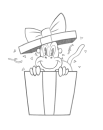For your homework this week, you'll be doing a series of gesture drawings. Use the six steps to break the body down into asymmetries, focusing on keeping within that 16 to 17 line ballpark.
I'd like you to:
- Do 10 gesture drawings from master copies.
- Do 10 gesture drawings from your imagination.
Master Copies
When I say "master copies," I mean drawings from any artists or sources that you like. Masters are not limited to classical artists like Michelangelo or Rubens. They can be from comics, video games, movies, or anything that inspires you. Go online and get art from the masters you love and admire! Draw from a range of contemporary to classical masters to broaden your understanding of gesture.
In the upcoming assignment demos, I will be drawing from:
- Michelangelo
- Rubens
- Rodin
- Rob Liefeld
- Abby from The Last of Us (Her body language communicates different emotions throughout the game and I want to show that you can draw from 3D reference as well.)
- Kratos from God of War (The evolution of his pose and body type tells an interesting story.)
You do not need to draw from these masters, they are only suggestions.
I believe that 3D character artists have just as much understanding of gesture, body language, movement, and dynamics as 2D concept artists. So, feel free to draw from 3D models, concept art, or any visual media where these principles are evident.
For other teachers, it might be unconventional to mix these sources, but I encourage you to use anything you like. The key is that the principles of gesture and asymmetry are present.
Drawing from Your Imagination
For the last part of the assignment, try 10 gesture drawings from your imagination. I know this is more challenging, especially with a new technique, but drawing from your head helps you:
- Disconnect from needing to represent something specific.
- Quickly learn what you don't understand.
- Identify areas where you need more focus.
If you're having trouble drawing gestures from imagination, try this: look at a reference photo, then visualize that same pose from a different angle and draw it. Or, use the reference as inspiration to create a follow-up pose from your imagination. I have included a handful of reference photos in the downloads section that you can use for this purpose. Give it a try!
This exercise will help you come back to your work with fresh eyes and a better understanding of where to improve.
* * *
Submit your assignment drawings (and reference images!) by March 5th for a chance to be included in the video critique. The Critique video should come out about a week after the due date.
Good luck with your homework this week!








